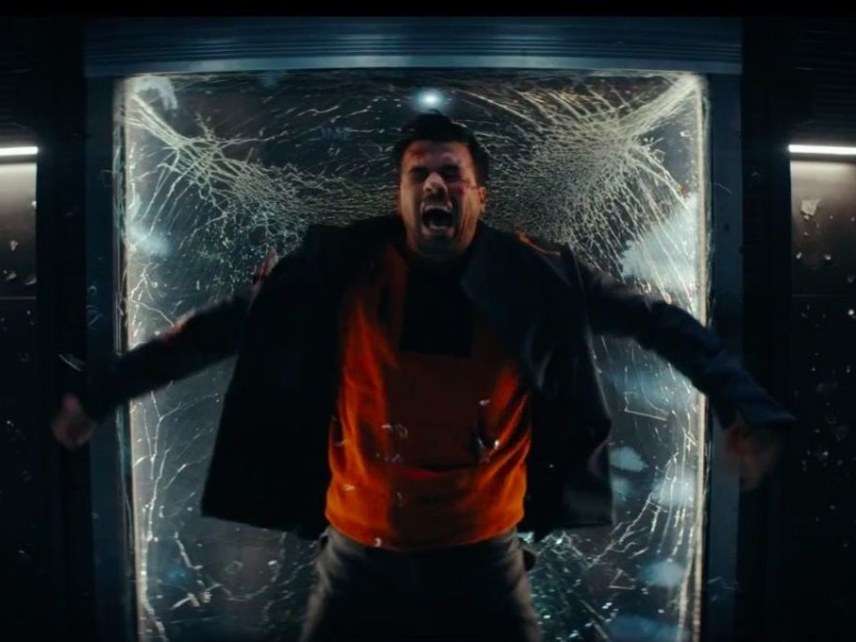Syfy's Adaptation of George R.R. Martin's Nightflyers Mangles a Ghost Story in Space
The show's derivative mimickry of time-skipping ruins the tension.

Nightflyers. Syfy. Sunday, December 2, 10 p.m.
The success of Game of Thrones has finally sent Hollywood nosing back into the earlier works George R.R. Martin, who wrote the novels on which the series is based. That could have resulted in a screen adaptation of one of two excellent horror novels: Either 1982's Fevre Dream, in which vampires ply their trade in a 19th-century riverboat, or 1983's Armageddon Rag, a ghost story in which the phantom is not the spirit of a person but an era, the 1960s.
Instead, Syfy has chosen to go with Nightflyers, a cultish 1980 novella (and some subsequent short stories) about what amounts to a haunted spaceship that Martin wrote to prove that horror and science fiction don't have to be two separate genres. Authoring a book to settle a feud between rival gangs of genre fanboys is probably not the most uplifting artistic inspiration. And nothing about this messy TV series is likely to challenge that assumption.
To be fair, Martin's deal with HBO for Game of Thrones doesn't allow him to play an active role in the production of Nightflyers. Much of what makes the show confusing and tedious is the work of series creator and chief writer Jeff Buhler, who has introduced a lot of needless malarkey into what Martin created as a relatively straightforward narrative.
Nightflyers is set in 2093 aboard a spaceship that that has set to find help for an Earth dying from an unspecified environmental catastrophe. The mission: seek aid from an advanced breed of aliens who so far have ignored all human attempts at contact.
The possibility of a hostile reaction from the extraterrestrials is just one worry of the crew. A much bigger one is that the ship will be destroyed long before reaching the aliens, by a series of rolling catastrophes—equipment failures, assaults, murders, Peeping Tom incidents—that begin almost immediately upon departure.
Much of the crew suspects the trouble is connected to the presence of Thale (British TV veteran Sam Strike), a powerful but unstable telepath whose assignment is to communicate with the aliens when their find. His hobby, though, is snatching images from the minds of the crewmen, which reveals some unsettling thoughts.
But other potential culprits abound, including the hermetic captain Roy Eris (David Ajala, Fast & Furious 6); the gender-fluid and somewhat spooky chief technology officer Lommie (Maya Eshet, Teen Wolf); and astrophysicist Karl D'Branin, who left a chaotic scene of domestic discord back on Earth (Eoin Macken, Night Shift).
All these borderline personalities are under the care of ship shrink Agatha Matheson (Gretchen Mol, Boardwalk Empire), who might be a suspect herself if she hadn't sliced open her own throat with a power saw in the show's first scene. Which brings us to what really ails Nightflyers—the affection of series creator and chief writer Jeff Buhler for what Hollywood refers to as "non-linear storytelling," skipping back and forth in the story's time line to prove what a narrative genius you are. Or, in Buhler's case, aren't.
Playing time tricks with a story's narrative can in skilled hands produce utter engrossing works like Memento, Christopher Nolan's 2000 film about a man incapable of forming short-term memories trying to solve the murder of his wife. More often, though, it results in the wholesale obliteration of dramatic tension. When you know from Nightflyers' first moments the precisely how and when she's going to die, how can you possibly be concerned when she's wedged into tight spots earlier in the story?
The constant, clumsy back-and-forth story line is not Nolan's only annoying affectation. He's also larded Nightflyer with references to other, better, works, from Star Trek to The Shining, probably intended in homage but really serving just to remind you how much better all of them were. And the abundant gore, no doubt a confused nod to Martin's original premise that horror and sci-fi can coexist in the same vehicle, serves no purpose at all. Buhler may think he's speaking in some advanced new artistic argot, but really, it's just a lot of outer-space jabberwocky.


Show Comments (15)